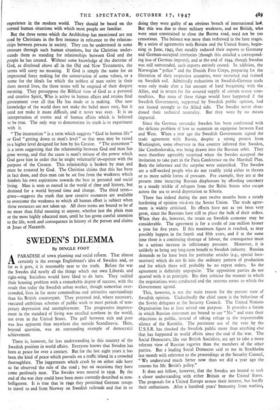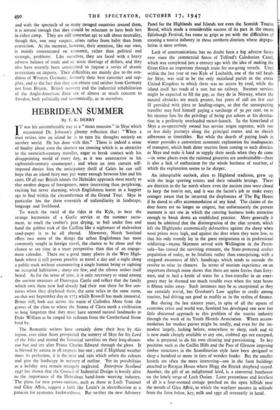SWEDEN'S DILEMMA
By DINGLE FOOT
APARADISE of town planning and social reform. That almost certainly is the average Englishman's idea of Sweden and, so far as it goes; it is reasonably near to the truth. Before the war the Swedes did nearly all the things which our own Liberals and right-wing Socialists would have liked to do here. They tackled their housing problem with a remarkable degree of success, with the result that today the Swedish urban worker, though somewhat over- crowded, lives in far more commodious and attractive surroundings than his British counterpart. They prepared and, where necessary, executed ambitious schemes of public work to meet periods of tem- porary depression and unemployment. The progressive improve- ment in the standard of living was excelled nowhere in the world, not even in the United States. The gulf between rich and poor was less apparent than anywhere else outside Scandinavia. Here, beyond question, was an outstanding example of democratic achievement.
There is, however, far less understanding in this country of the Swedish position in world affairs. Everyone knows that Sweden has been at peace for over a century. But for the last eight years it has been the kind of peace which prevails on a traffic island in a crowded thoroughfare. The juggernauts which crash by on either side have so far observed the rule of the road ; but on occasions they have come perilously near. The Swedes were neutral in 1939. By the end of the war they could have been more correctly described as non- belligerent. It is true that in 1940 they permitted German troops to travel to and from Norway on Swedish railroads and that in so
doing they were guilty of an obvious breach of international lat. But this was due to sheer military weakness, and we British, who were once constrained to close the Burma road, need not be too censorious. The balance was more than redressed in the later stages. By a series of agreements with Britain and the United States, begin- ning in June, 1943, they steadily reduced their exports to Germany and German-occupied territories (though this entailed a correspond- ing loss of German imports), and at the end of 5944, though Sweden was still surrounded, such exports entirely ceased. In addition, the Norwegian " police " and the Danish Free Corps, preparing for the liberation of their respective countries, were recruited and trained on Swedish soil. Admittedly reductions in Swedish-German trade were only made after a fair amount of hard bargaining with the Allies, and in return for the assured supply of certain scarce com- modities. But none of these things would have happened if the Swedish Government, supported. by Swedish public opinion, had not leaned strongly to the Allied side. The Swedes never aban- doned their technical neutrality. But they were by no means impartial.
Since the German surrender Sweden has been confronted with the delicate problem of how to maintain an equipoise between East and West. When a year ago the Swedish Government signed the trade agreement with Russia, despite a strong protest from Washington, some observers in this country inferred that Sweden, like Czechoslovakia, was being drawn into the Russian orbit. They were therefore agreeably surprised when the Swedes accepted the invitation to take part in the Paris Conference on the Marshall Plan. Both the inference and the surprise were unjustified. The Swedes are a stiff-necked people who do not readily yield either to threats or to more subtle forms of pressure.- For example, they are at the present time incurring Russian displeasure by affording sanctuary to a steady trickle of refugees from the Baltic States who escape across the sea to avoid deportation to Siberia.
There has indeed during the past twelve months been a steady hardening of opinion vis-a-vis the Soviet Union. The trade agree- ment is widely criticised. Its effects have not as yet been very great, since the Russians have still to place the bulk of their orders. When they do, however, the strain on Swedish economy may be considerable. The agreement is for a credit of zoo million kroner a year for five years. If this maximum figure is reached, as may possibly happen in the fourth and fifth years, and if at the same time there is a continuing shortage of labour, the consequence must be a serious increase in inflationary pressure. Moreover, it is unlikely to bring any long-term benefit to Swedish industry. Russian demands so far have been for particular articles (e.g., special loco- motives) which do not fit into the ordinary pattern of production and for which there will probably be no repeat orders. So the agreement is definitely unpopular. ' The opposition parties do not quarrel with it in principle. But they criticise the manner in which the negotiations were conducted and the onerous terms to which the Government agreed.
This, however, is not the main reason for the present state of Swedish opinion. Undoubtedly the chief cause is the behaviour of the Soviet delegates at the Security Council. The United Nations Organisation has at least served one purpose. It provides a forum in which Russian statesmen are bound to say " No " and state their objections in public, instead of taking refuge in the impenetrable silence of the Kremlin. The persistent use of the veto by the U.S.S.R. has shocked the Swedish public more than anything else that has happened in world affairs since the end of the war. The Social Democrats, like our British Socialists, are apt to take a more tolerant view of Russian vagaries than the members of the other parties. But a leading Social Democrat said to me in Stockholm last month with reference to the proceedings at the Security Council, "We understand much better now than we did a year ago the reasons for Mr. Bevin's policy."
It does not follow, however, that the Swedes are bound to seek a closer understanding with either Britain or the United States. The proposals for a United Europe arouse their interest, but hardly their enthusiasm. After a hundred years' Immunity from warfare, and with the spectacle of so many ravaged countries around them, it is natural enough that they should be reluctant to have both feet in either camp. They are still somewhat apt to talk about neutrality, though this, one may suspect, arises rather from habit than from conviction. At the moment, however, their attention, like our own, is mainly concentrated on economic, rather than political and strategic, problems. Like ourselves, they are faced with a heavy adverse balance of trade and an acute shortage of dollars, and they also have recently been constrained to impose a series of drastic restrictions on imports. Their difficulties are mainly due to the con- dition of Western Germany, formerly their best customer and sup- plier, and to the fact that they can obtain coal neither from Germany nor from Britain. British recovery and the industrial rehabilitation of the Anglo-American Zone are of almost as much concern to Sweden, both politically and economically, as to ourselves.



































 Previous page
Previous page